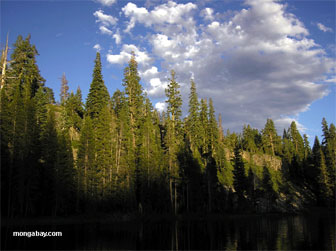California sues Bush administration forest law repeal
California sues Bush administration forest law repeal
mongabay.com
September 21, 2006
Yesterday California sued the Bush Administration over its repeal of the Clinton era “Roadless Rule” which set aside large areas of forest from development.
According to a release from state Attorney General Bill Lockyer, “The Northern Federal District of California ruled the U.S. Forest Service violated federal environmental laws by stripping national forest roadless areas of protection from road-building and logging without performing any environmental analysis of the consequences. The court ordered the immediate reinstatement of protections for nearly 50 million acres of remaining undeveloped forests.”
A news release from the state of California appears below.
Attorney General Lockyer Announces Court Rules That Bush Unlawfully Removed Protection for Nearly 50 Million Acres of Forest Land
Federal Magistrate Judge Reinstates “Roadless Rule” for U.S. Forests
Attorney General Bill Lockyer today announced that the Northern Federal District of California ruled the U.S. Forest Service violated federal environmental laws by stripping national forest roadless areas of protection from road-building and logging without performing any environmental analysis of the consequences. The court ordered the immediate reinstatement of protections for nearly 50 million acres of remaining undeveloped forests.

Sierra forest. Photo by Rhett Butler
|
“There is a public process to be followed,” said Lockyer. “And no agency can circumvent it. Today’s ruling is a solid victory for the rule of law, public participation, and government accountability. More than 4.4 million acres of pristine national forest in California and nearly 50 million acres nationwide are protected again.”
In 2001, the Clinton Administration adopted a nationwide “Roadless Rule” that banned nearly all road-building and logging in national forest roadless areas. Roadless areas are landscapes of 5,000 or more contiguous acres virtually lacking in development. They provide a vital source of fresh water in the arid West, and habitat for more than 2,000 imperiled or sensitive species.
In 2005, the Bush Administration repealed the Rule, allowed roadless areas to be managed under forest-specific land management plans that generally permitted some development, and established a new process whereby state governors could petition the Forest Service for less or more roadless-area protection within their state. The Attorneys General of California and New Mexico, the Governors of Washington and Oregon, and twenty environmental groups filed suit in the Northern District of California, challenging the Bush Administration’s new regulation as violating the National Environmental Policy Act (NEPA) and the federal Endangered Species Act (ESA).
NEPA requires federal agencies to analyze and publicize the environmental consequences of their proposed actions and to consider and compare alternative courses of action with an eye to minimizing environmental harm. The ESA requires that federal agencies consult with the Fish and Wildlife Service and the National Marine Fisheries Service before undertaking any action that may affect threatened or endangered species. In repealing the Roadless Rule, the Forest Service did not prepare an impact statement, did not consider alternatives, and did not consult with the expert fish and wildlife agencies, the court determined.
“It would strain credulity to hold that the repeal of the protections in [roadless areas] would not have any effect on the numerous [threatened and endangered] species that make their homes in the [roadless areas],” stated Magistrate Judge Elizabeth Laporte.
The U.S. Forest Service claimed that its new regulation establishing a “State Petition” process was simply procedural therefore it required no NEPA or ESA process. The agency also asserted it could postpone an environmental analysis and ESA consultation until it received state-specific petitions, because until such time, any impact was speculative.
The court rejected both arguments. Magistrate Judge Laporte wrote, “The impact of the State Petitions Rule is not speculative; it replaced the Roadless Rule, thereby reducing protections of [roadless areas] across the country by reverting to the land management plans for each forest.” The court further emphasized that plaintiffs’ challenge could not wait: “This is Plaintiffs’ only opportunity to challenge the programmatic Rule,” because “[n]o regulation any longer prevents additional projects in roadless areas from being approved and commenced during the petitioning process.”
The U.S. Forest Service has 60 days from the entry of judgment to challenge today’s ruling in the Ninth U.S. Circuit Court of Appeals.
This is a modified State of California news release







